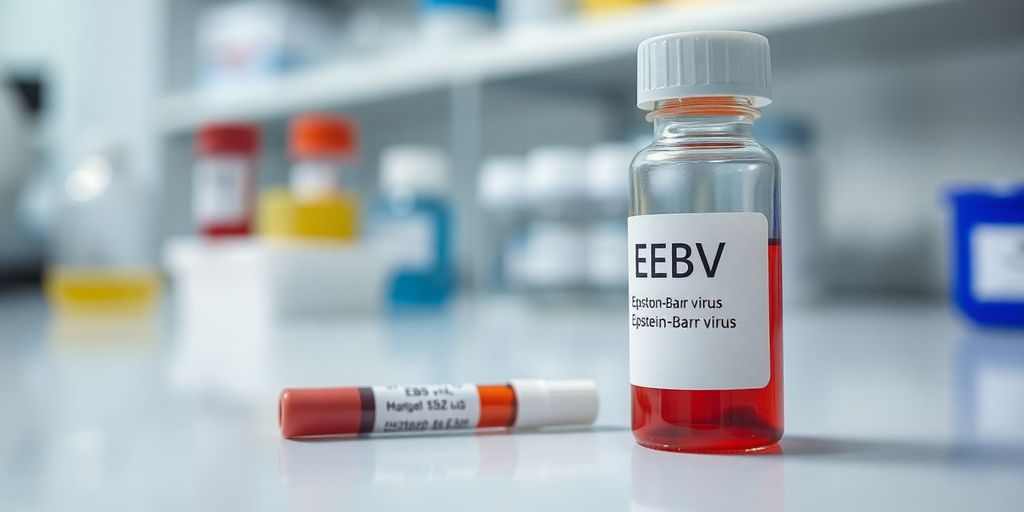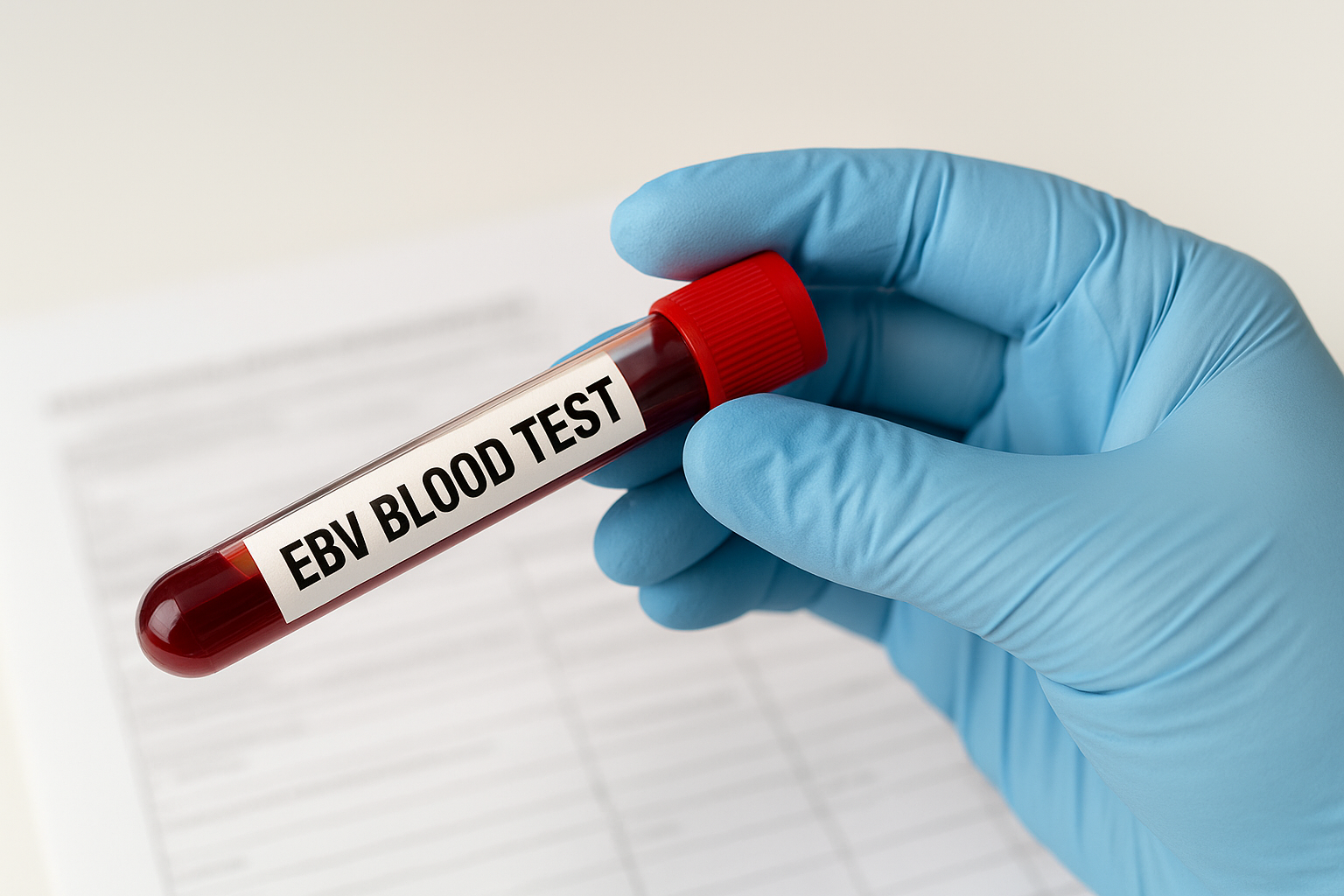Feeling run down with a sore throat and swollen glands? You might be wondering if it’s the common ‘mono.’ Epstein-Barr Virus (EBV) is the usual culprit, and a simple blood test, often called an EBV blood test, can help figure things out. This test looks for specific antibodies in your blood that show up when your body fights off the virus. It’s a helpful tool for doctors to understand if you have a current infection, had one in the past, or if something else might be causing your symptoms.
Key Takeaways
- An EBV blood test detects antibodies to the Epstein-Barr Virus, helping doctors diagnose infections like mononucleosis.
- Different EBV antibodies (like VCA IgM, VCA IgG, and EBNA) can indicate whether an infection is recent, past, or if you’re susceptible.
- Symptoms like extreme fatigue, fever, sore throat, and swollen lymph nodes might prompt a doctor to order an EBV blood test.
- This test helps distinguish EBV from other illnesses that can cause similar symptoms, which is important for proper treatment.
- Knowing your EBV status through a blood test can lead to faster symptom management and inform decisions about your health and activities.
What is an EBV Blood Test?
So, you’ve been feeling off, maybe tired or a bit under the weather, and your doctor mentioned the Epstein-Barr virus (EBV). What exactly is an EBV blood test, and why would you need one? Think of it as a detective for your blood, looking for clues that point to whether you’ve encountered this common virus.
Definition and purpose
An EBV blood test is a lab examination that looks for antibodies, which are proteins your immune system makes to fight off infections. The main goal is to figure out if you have an active EBV infection, had one in the past, or if you’ve never been exposed to it. While EBV is super common – most people get it at some point – it’s the usual culprit behind infectious mononucleosis, or
Symptoms That May Lead to an EBV Blood Test
So, you’re feeling pretty rough, huh? Maybe you’ve got that crushing fatigue that makes getting out of bed feel like climbing a mountain, or perhaps a sore throat that just won’t quit. Fever, swollen glands in your neck or armpits – these are all classic signs that something’s up. While these symptoms can point to a bunch of different things, they’re also common indicators of an Epstein-Barr Virus (EBV) infection, often known as mononucleosis or “mono.”
Common symptoms of EBV infection
When EBV decides to make an appearance, especially if it’s your first encounter with it as a teen or young adult, it can really knock you off your feet. Here’s what you might experience:
- Extreme Fatigue: This isn’t just feeling a bit tired; it’s a profound exhaustion that can last for weeks or even months.
- Fever: A persistent elevated temperature is common.
- Sore Throat: Often severe and can make swallowing difficult.
- Swollen Lymph Nodes: You might feel tender lumps in your neck, armpits, or groin.
- Headache: A common accompanying symptom.
- Muscle Aches: General body discomfort can also occur.
- Enlarged Spleen or Liver: In some cases, these organs can become swollen, which might cause abdominal discomfort.
It’s worth noting that many people, especially children, get infected with EBV and have very mild or even no symptoms at all. But if you’re an adult or teen experiencing a cluster of these symptoms, it’s definitely a good time to consider what might be causing them.
When doctors recommend the Epstein-Barr virus test
Your doctor isn’t just going to order an EBV blood test out of the blue. They’ll typically consider it when your symptoms strongly suggest mono, but maybe a standard “mono test” (which looks for a specific antibody) comes back negative. This happens more often than you might think, particularly in younger kids.
Sometimes, symptoms can be a bit vague, or they might mimic other illnesses. This is where the EBV blood test really shines, helping to pinpoint the cause of your misery.
Doctors might also suggest an EBV test if:
- You’ve had symptoms for a while, and they aren’t improving as expected.
- They want to check if you’ve had EBV in the past, perhaps to understand a lingering health issue.
- In pregnant individuals, flu-like symptoms might prompt testing to rule out EBV versus other infections that could pose risks to the baby. It’s important to get a clear diagnosis, especially when dealing with conditions like strep throat, which requires antibiotics, or other viral infections that can have different implications. Getting tested can help distinguish between these possibilities, ensuring you get the right care. You can find more information about Epstein-Barr virus (EBV) and its effects on the body.
How an Epstein-Barr Virus test helps in Diagnosis

So, you’re feeling under the weather and your doctor suspects Epstein-Barr Virus (EBV). That’s where the Epstein-Barr Virus test comes in handy. It’s not just about saying “yes, it’s EBV”; it’s about figuring out when you might have picked it up and what that means for you. This isn’t always a straightforward diagnosis, especially since EBV can mimic other illnesses, but the right blood tests can really clear things up.
Detecting Acute vs. Past Infections
One of the main ways an Epstein-Barr Virus test helps is by looking at different antibodies your body makes in response to the virus. Think of these antibodies like little flags that tell a story about your history with EBV. The presence and type of these antibodies can tell your doctor if you’re currently fighting off a fresh infection or if you’ve had EBV sometime in the past.
- Viral Capsid Antigen (VCA) IgM: If this antibody is present, it often points to a recent or acute EBV infection. It’s usually one of the first signs your body is actively battling the virus.
- Viral Capsid Antigen (VCA) IgG: Finding this antibody suggests you’ve had EBV at some point. It shows up a bit later than IgM and sticks around for a long time, indicating a past infection.
- Epstein-Barr Nuclear Antigen (EBNA): This antibody typically appears a few months after the initial infection and stays with you for life. Its presence usually means the acute phase of the infection has passed, and you have immunity.
The specific combination of these antibodies, along with your symptoms, is what helps paint a clear picture for your doctor. It’s like piecing together a puzzle to understand the timeline of the infection.
Differentiating EBV from Other Illnesses
Sometimes, the symptoms of an EBV infection, like fatigue and fever, can be pretty generic. They might overlap with other conditions, such as the flu, cytomegalovirus (CMV), or even certain autoimmune disorders. This is where the Epstein-Barr Virus test becomes really important. By looking for those specific EBV antibodies, doctors can rule out other possibilities and confirm if EBV is indeed the culprit. This precision is key to getting the right advice and care. Even if you’re considering an at-home Epstein-Barr test, understanding what the results mean in the context of your symptoms is vital. While convenient, an at-home Epstein-Barr test should ideally be discussed with a healthcare provider for accurate interpretation, especially if symptoms persist. Getting a clear diagnosis means you can stop worrying about what’s wrong and focus on feeling better. If you’re curious about your EBV status, you can explore options for testing services.
Preparing for an EBV Blood Test

Getting ready for an Epstein-Barr Virus (EBV) blood test is pretty straightforward. Most of the time, you won’t need to do anything special before your appointment. However, it’s always a good idea to check with your doctor or the lab if they have any specific instructions. Sometimes, they might ask you to fast for a few hours beforehand, but this isn’t usually the case for EBV tests.
What Patients Should Know Before the Test
Before you head in for your blood draw, it’s helpful to know what to expect. The test itself is a standard blood draw, similar to what you’d have for many other medical checks. You’ll want to wear clothing with sleeves that can be easily rolled up. If you’re feeling a bit anxious about needles, letting the phlebotomist know beforehand can be helpful; they’re used to it and can often make the process smoother. It’s also a good time to mention any medications you’re currently taking, just in case.
Sample Collection Process (Blood Draw)
When it’s time for the actual sample collection, a healthcare professional will clean a small area of your skin, usually on your arm. They’ll then insert a needle into a vein to collect a blood sample. It’s a quick process, typically taking only a few minutes. The collected blood is then placed into vials for transport to the laboratory. For EBV serology, the lab typically needs about 1.0 ml of serum, collected in a clotted blood vacutainer tube. If you’re considering an at-home blood test, the process is similar, with a kit provided for you to collect your own sample, usually via a finger prick, which is then mailed to a lab.
It’s important to make sure the sample is properly labeled with your full name and date of collection. This helps prevent any mix-ups at the lab and ensures your results are accurate. If you’re using a kit, follow the instructions carefully for labeling and packaging.
Here’s a quick rundown of what happens:
- A trained professional will identify a vein, usually in your arm.
- The area is cleaned to prevent infection.
- A needle is inserted to collect the blood sample.
- A bandage is applied to the puncture site.
- The sample is sent to the lab for analysis.
Remember, the sooner you get tested, the sooner you can understand your health status. If you have concerns, reaching out to your doctor is the first step. You can also find more information about lab testing by visiting Mayo Clinic Laboratories.
Benefits of Early Diagnosis Through EBV Blood Test
Getting a clear picture of your health status early on can make a big difference, especially when it comes to viruses like Epstein-Barr. Knowing if you’ve had EBV, or if you’re currently dealing with an active infection, helps your doctor figure out the best way forward. This is particularly useful for diagnosing mono infection when symptoms are present but other tests might be inconclusive.
Faster Treatment and Symptom Management
When an EBV blood test points to a recent infection, it can help explain the lingering fatigue, sore throat, or swollen glands you might be feeling. This allows for more targeted advice on managing your symptoms and recovery. For instance, knowing it’s EBV means you can focus on rest and hydration, rather than worrying about other potential causes. It also helps avoid unnecessary treatments for conditions that aren’t present.
Informing Lifestyle and Work Decisions
Understanding your EBV status can also influence your daily life. If you’re dealing with a recent infection, you might need to adjust your work schedule or social activities to allow for proper recovery. For athletes or those with physically demanding jobs, knowing the status of an EBV infection is important for preventing complications like spleen rupture, which can happen with mono. This information helps you make informed choices about your health and activities, preventing setbacks and promoting a smoother return to your normal routine. It’s all about getting the right information to take care of yourself properly, and EBV antibody tests are a key part of that.
Know Your EBV Status with a Blood Test
Knowing your Epstein-Barr Virus (EBV) status can be really helpful, especially if you’ve been feeling under the weather for a while or have had symptoms that just won’t quit. This isn’t just about getting a diagnosis for something like mononucleosis; it’s about understanding what’s going on in your body.
Think of the EBV blood test, sometimes called a mononucleosis test, as a detective for your blood. It looks for different signs, or antibodies, that your body makes when it fights off EBV. The results can tell a story about whether you’ve had the virus recently, a long time ago, or if you’ve never been exposed.
Here’s a quick look at what the different antibodies might mean:
- VCA IgM: If this shows up, it usually means you have a recent or active EBV infection. It’s like the first responder to the virus.
- VCA IgG: This antibody appears early in the infection and sticks around for life. Seeing this means you’ve been exposed to EBV at some point.
- EBNA: This one takes a bit longer to show up, usually a few months after you first get infected, and it also stays with you forever. It’s a good indicator of a past infection.
Understanding these results helps your doctor figure out the best way to manage your health. It’s not just about identifying the virus; it’s about getting a clear picture of your immune system’s history with EBV. This information can guide decisions about your well-being and how you approach your daily life.
Frequently Asked Questions
What exactly is an EBV blood test?
An Epstein-Barr virus (EBV) blood test looks for special proteins called antibodies in your blood. Your body makes these antibodies to fight off the EBV, the virus that causes mono. The test helps doctors figure out if you have a new EBV infection, had one in the past, or if it’s causing your current symptoms.
When would a doctor order an EBV blood test?
Doctors might suggest an EBV blood test if you have symptoms like a sore throat, fever, extreme tiredness, or swollen glands, but a regular mono test doesn’t show anything. It’s also used if your symptoms are unusual or last a long time, or to see if EBV is causing problems in pregnant women.
How do different EBV antibodies help tell if an infection is new or old?
Different types of EBV antibodies show up at different times. For example, VCA IgM antibodies usually show up early in a new infection and then disappear. VCA IgG antibodies appear early, too, but stick around for a long time. EBNA antibodies usually show up later, after the infection has passed, and stay for life. By looking at which antibodies are present, doctors can tell if the infection is new or old.
How does the test help doctors figure out what’s wrong?
The EBV blood test helps by spotting the specific antibodies your body creates to fight the virus. This helps doctors confirm if EBV is the reason you’re feeling sick, especially when your symptoms are similar to other illnesses like the flu or other infections. It’s like a detective for your body’s immune response.
What are the good things about finding out about EBV early?
Getting tested early means you can find out sooner if EBV is the cause of your symptoms. This can help you manage your sickness better, like getting rest and fluids. Knowing your EBV status can also help you make decisions about your daily life, like whether you need to take time off from school or work.
Can you have EBV and not know it?
Most people get EBV at some point, often without knowing it. If you had it a long time ago, you’ll likely have certain antibodies (like EBNA) that stay in your body forever. If you have a new infection, you’ll have different antibodies (like VCA IgM). The test helps sort out whether you’re currently fighting the virus or if it’s something from your past.

